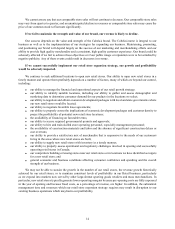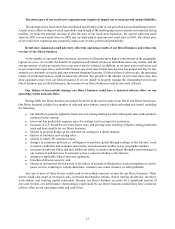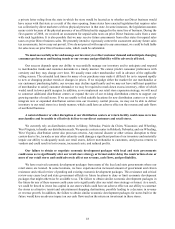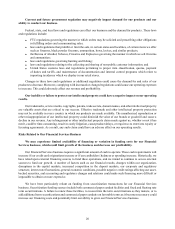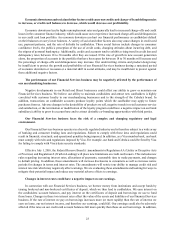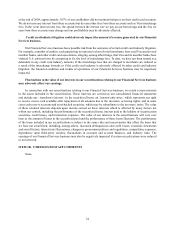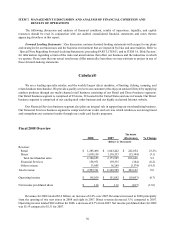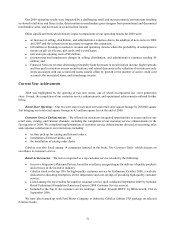Cabela's 2008 Annual Report Download - page 28
Download and view the complete annual report
Please find page 28 of the 2008 Cabela's annual report below. You can navigate through the pages in the report by either clicking on the pages listed below, or by using the keyword search tool below to find specific information within the annual report.23
Economic downturns and social and other factors could cause our credit card charge-offs and delinquencies
to increase, or credit card balances to decrease, which would decrease our profitability.
Economic downturns lead to higher unemployment rates and generally lead to increased charge-offs and credit
losses in the consumer finance industry, which could cause us to experience increased charge-offs and delinquencies
in our credit card loan portfolio. An economic downturn can hurt our financial performance as cardholders default
on their balances or carry lower balances. A variety of social and other factors also may cause changes in credit card
use, payment patterns, and the rate of defaults by cardholders. These social factors include changes in consumer
confidence levels, the public’s perception of the use of credit cards, changing attitudes about incurring debt, and
the stigma of personal bankruptcy. Additionally, credit card accounts tend to exhibit a rising trend in credit loss and
delinquency rates between 18 to 30 months after they are issued. If the rate of growth in new account generation
slows, the proportion of accounts in the portfolio that have been open for between 18 to 30 months will increase and
the percentage of charge-offs and delinquencies may increase. Our underwriting criteria and product design may
be insufficient to protect the growth and profitability of our Financial Services business during a sustained period
of economic downturn or recession or a material shift in social attitudes, and may be insufficient to protect against
these additional negative factors.
The performance of our Financial Services business may be negatively affected by the performance of
our merchandising businesses.
Negative developments in our Retail and Direct businesses could affect our ability to grow or maintain our
Financial Services business. We believe our ability to maintain cardholders and attract new cardholders is highly
correlated with customer loyalty to our merchandising businesses and to the strength of the Cabela’s brand. In
addition, transactions on cardholder accounts produce loyalty points which the cardholder may apply to future
purchases from us. Adverse changes in the desirability of products we sell, negative trends in retail customer service
and satisfaction, or the termination or modification of the loyalty program could have a negative impact on our bank
subsidiary’s ability to grow its account base and to attract desirable co-branding opportunities with third parties.
Our Financial Services business faces the risk of a complex and changing regulatory and legal
environment.
Our Financial Services business operates in a heavily regulated industry and is therefore subject to a wide array
of banking and consumer lending laws and regulations. Failure to comply with these laws and regulations could
result in financial, structural, and operational penalties being imposed. In addition, as a Visa member bank, our bank
must comply with rules and regulations imposed by Visa. For example, our bank and Cabela’s could be fined by Visa
for failing to comply with Visa’s data security standards.
Effective July 1, 2010, the Federal Reserve Board’s “amendments to Regulation AA (Unfair or Deceptive Acts
or Practices) and Regulation Z (Truth in Lending) will place new limitations on credit card issuers. This includes new
rules regarding increasing interest rates, allocations of payments, reasonable time to make payments, and changes
to default pricing. In addition, these amendments will increase disclosures to consumers as well as increase notice
periods for changes in terms and interest rates. The amendments will restrict our ability to manage credit risk and
interest rate risk which may negatively affect earnings. We are evaluating these amendments and looking for ways to
mitigate their potential impact and reduce any material adverse effects to earnings.
Changes in interest rates could have a negative impact on our earnings.
In connection with our Financial Services business, we borrow money from institutions and accept funds by
issuing brokered and non-brokered certificates of deposit, which we then lend to cardholders. We earn interest on
the cardholders’ account balances, and pay interest on the certificates of deposit and borrowings we use to fund
those loans. Changes in these two interest rates affect the value of the assets and liabilities of our Financial Services
business. If the rate of interest we pay on borrowings increases more (or more rapidly) than the rate of interest we
earn on loans, our net interest income, and therefore our earnings, could fall. Our earnings could also be adversely
affected if the rates on our credit card account balances fall more quickly than those on our borrowings. In addition,



